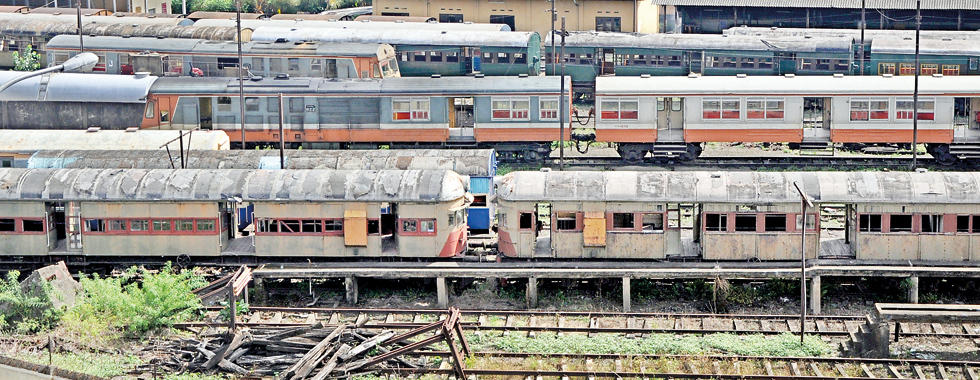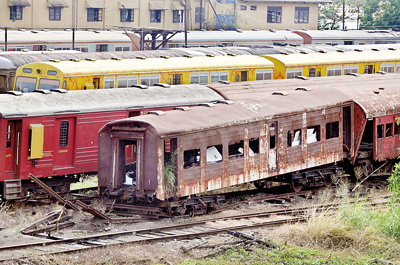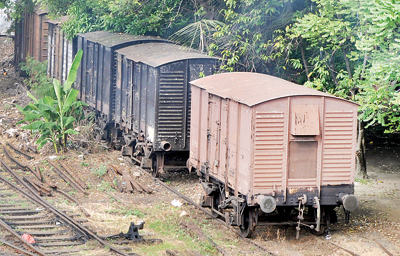News
The great train robbery
Amidst charges of racketeering, corruption and lack of transparency, discarded engines and bogies have been left to corrode and disintegrate in various railway yards across the country, instead of being recycled or sold as money-spinning scrap iron, the Sunday Times learns.

A Railway trade unionist has charged that hundreds and thousands of tons of railway scrap iron worth billions of rupees are lying idle in several premises, including the Colombo Fort Railway Station complex and the yards at Ratmalana, Maradana, Dematagoda, Kadugannawa, Puttalam and Alawwa.
Sumathipala Manamaduwa from the All Ceylon Railway General Workers’ Union (ACRGWU) told the Sunday Times that suggestions to sell the scrap iron to both local and foreign buyers had fallen on deaf years.
“Each year, some 7,000 tons of locomotive components, including engines and compartments, are put aside and they remain piled up at various railway sheds. They could easily be sold-for huge sums and the revenue could help the cash-strapped railway coffers,” he said.
The trade unionist said in the 1970s the department had been selling such discarded items to various buyers through tender procedures, but this was not the case today. “Back then, the authorities even recycled the iron to manufacture nails, bolts, fittings and other items,” Mr. Manamaduwa said.
He said Sri Lanka Railways (SLR) – as the department is known today — could sell small quantities of the scrap iron to small-time local entrepreneurs, such as blacksmiths, television antenna makers, producers of steel and iron gates, cooking utensils etc.
Several Indian companies were also keen to buy scrap iron and this market could be tapped but no initiative had been taken, he said.
He charged that people with political backing periodically removed large chunks of railway scrap iron taking advantage of certain loop holes in the law.

“This has been going on for some time under different administrations and those who dare to speak up are intimidated, victimised and eventually shown the door. The responsibility lies with SLR’s Administrative Division that has taken little action, so the plunder continues,” Mr. Manamaduwa added.
He said thieves also removed a sizeable quantity of the scrap iron often with the connivance of station authorities. If and when the SLR decided to sell the scrap iron to large-scale buyers, Mr. Manamaduwa said he believed the tenders would be awarded to politicians and their cronies with little transparency being observed. A senior SLR official who did not wish to be named concurred. He said scrap iron was being pilfered on a large scale with the backing of high-ranking politicians and other officials.
He said the iron was being taken out of the yards on various pretexts such as construction work at State buildings and schools and repairs on railway bridges.
“But this is never the case, and the bulk of the scrap iron, if not all, is being shipped out of the country on the sly, mainly to buyers in India in return for large sums of money. Eventually it’s the Department that is being ripped-off,” he added, charging that this was the main reason why the Department was not interested in calling for tenders for the sale of the scrap iron.
However, SLR General Manager B. A. P. Ariyaratne denied any illegal deals were taking place regarding the sale of scrap iron.
“There is a strict government tender procedure and we adhere to it at all times with the fullest degree of transparency and no one can dispute this either within the Railway Department or outside,” he said.

However, he said, there were delays in the procedures involved in disposing the scrap. Prior to the calling of tenders the Survey Board at the Department is tasked to examine the train components and provide a report to ascertain if they were still usable or should be sold as scrap.
“Once this is completed the Stores Department is told to go ahead and call for tenders and then the transaction is completed,” Mr. Ariyaratne said. However, he added that on one occasion last year the SLR was forced to skip the tender procedure and sell- several tons of scrap iron following allegations that the site was breeding mosquitoes.
“This happened at the railway workshop in Ratmalana, where the chief engineer was taken to courts and penalised. This followed a complaint by residents of the area who claimed that the scrap iron collected rain water and were potential mosquito breeding grounds.
Mr. Ariyaratne added that there were new moves to sell outdated rails to the retail markets with the target group being small-scale entrepreneurs involved in the metal industry.

